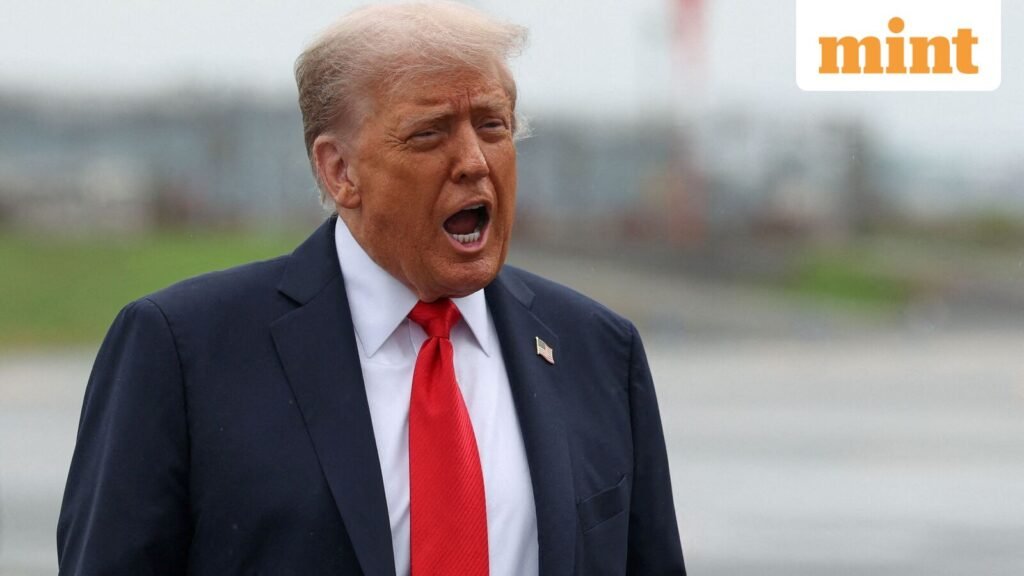President Donald Trump has formally declared that the United States is engaged in an “armed conflict” with foreign drug cartels, labelling them terrorist organisations and classifying suspected smugglers as “unlawful combatants,” according to a confidential notice sent to Congress this week.
The document, as obtained and reported by The New York Times, expands upon the administration’s legal justification for recent US military strikes in the Caribbean, which left 17 people dead, and signals Trump’s intention to invoke sweeping wartime powers against transnational criminal groups.
Why is the Trump administration framing this as an ‘armed conflict’?
The notice from Trump administration argues that cartels engaged in drug smuggling constitute “nonstate armed groups” whose actions amount to “an armed attack against the United States.”
It describes the military campaign as a “noninternational armed conflict” — a term in international law usually applied to civil wars or conflicts with insurgent movements.
“Based upon the cumulative effects of these hostile acts against the citizens and interests of the United States and friendly foreign nations, the president determined that the United States is in a noninternational armed conflict with these designated terrorist organizations,” the notice reads.
What powers does this give US President Donald Trump?
By designating the campaign as an armed conflict, Trump is claiming authority to:
- Order targeted killings of cartel members without proof of imminent threat.
- Detain suspects indefinitely without trial.
- Use military commissions instead of civilian courts.
Legal specialists warn this marks a dramatic departure from established practice. Geoffrey S. Corn, a retired Army legal adviser on the laws of war, condemned the move.
“This is not stretching the envelope,” Corn said. “This is shredding it. This is tearing it apart.”
How has the White House defended the strikes?
Anna Kelly, a White House spokeswoman, insisted Donald Trump’s actions were lawful:
“The president acted in line with the law of armed conflict to protect our country from those trying to bring deadly poison to our shores, and he is delivering on his promise to take on the cartels and eliminate these national security threats from murdering more Americans.”
The administration has framed the killings as acts of “self-defence,” arguing that drug trafficking is directly linked to the tens of thousands of US overdose deaths each year.
Are drug cartels comparable to Al Qaeda or ISIS?
The Trump administration’s reasoning recalls the Bush-era justification for military action against Al Qaeda after the September 11 attacks. Then, the US Supreme Court accepted that a nonstate group engaged in deliberate mass violence against Americans could trigger the laws of war.
Critics, however, point out that cartels have not launched armed attacks on US soil. Corn argued that “selling a dangerous product is different from an armed attack.”
Brian Finucane, a former State Department lawyer and conflict law expert, said the legal theory was tenuous.
“One major problem, however, is that it is far from clear that whoever they are targeting is an organized armed group such that the U.S. could be in a NIAC [noninternational armed conflict] with it,” he said.
What are the political risks of Donald Trump’s move?
Congressional Democrats expressed alarm, accusing the president of unilaterally authorising secret wars. Senator Jack Reed, the ranking Democrat on the Senate Armed Services Committee, warned:
“Drug cartels are despicable and must be dealt with by law enforcement. But now, by the president’s own words, the U.S. military is engaged in armed conflict with undefined enemies he has unilaterally labelled ‘unlawful combatants,’ and he has deployed thousands of troops, ships and aircraft against them. Yet he has refused to inform Congress or the public.”
What comes next for Trump vs Drug Cartels?
The Trump administration has not named the cartels it considers enemy combatants, though officials have pointed to Venezuela’s Tren de Aragua. A declassified intelligence assessment earlier this year described it as “loosely organised” and “decentralised,” raising questions about whether it meets the threshold of an “armed group” under international law.
For now, the president’s claim that the US is at war with cartels represents not just rhetorical escalation but a profound shift in legal framing — one that could redefine America’s decades-long “war on drugs” into a literal one.




